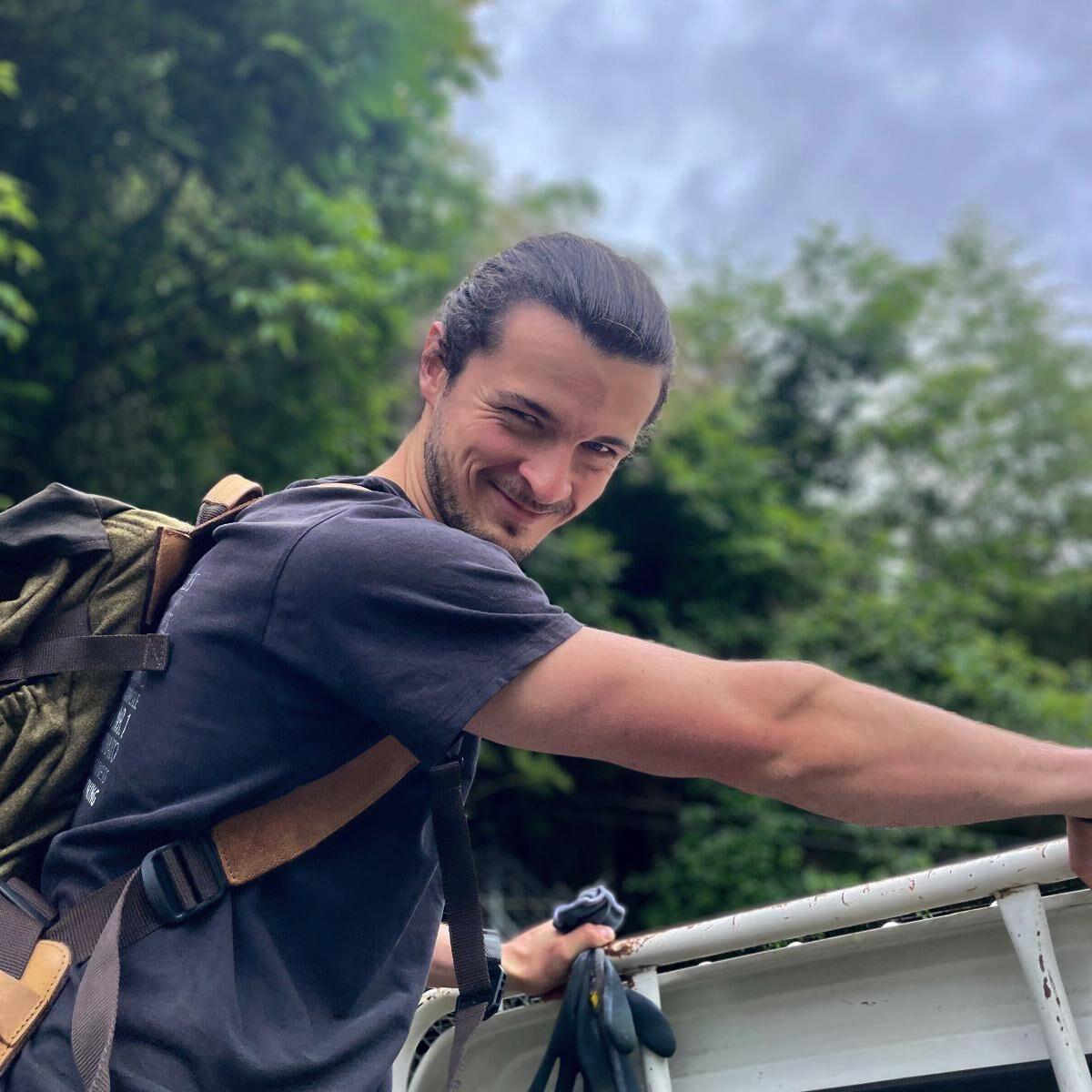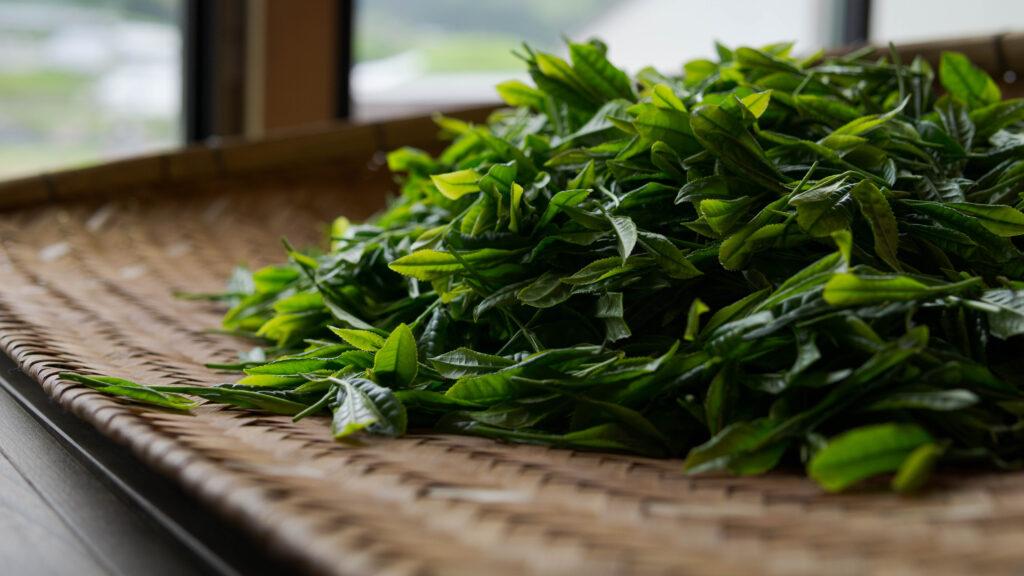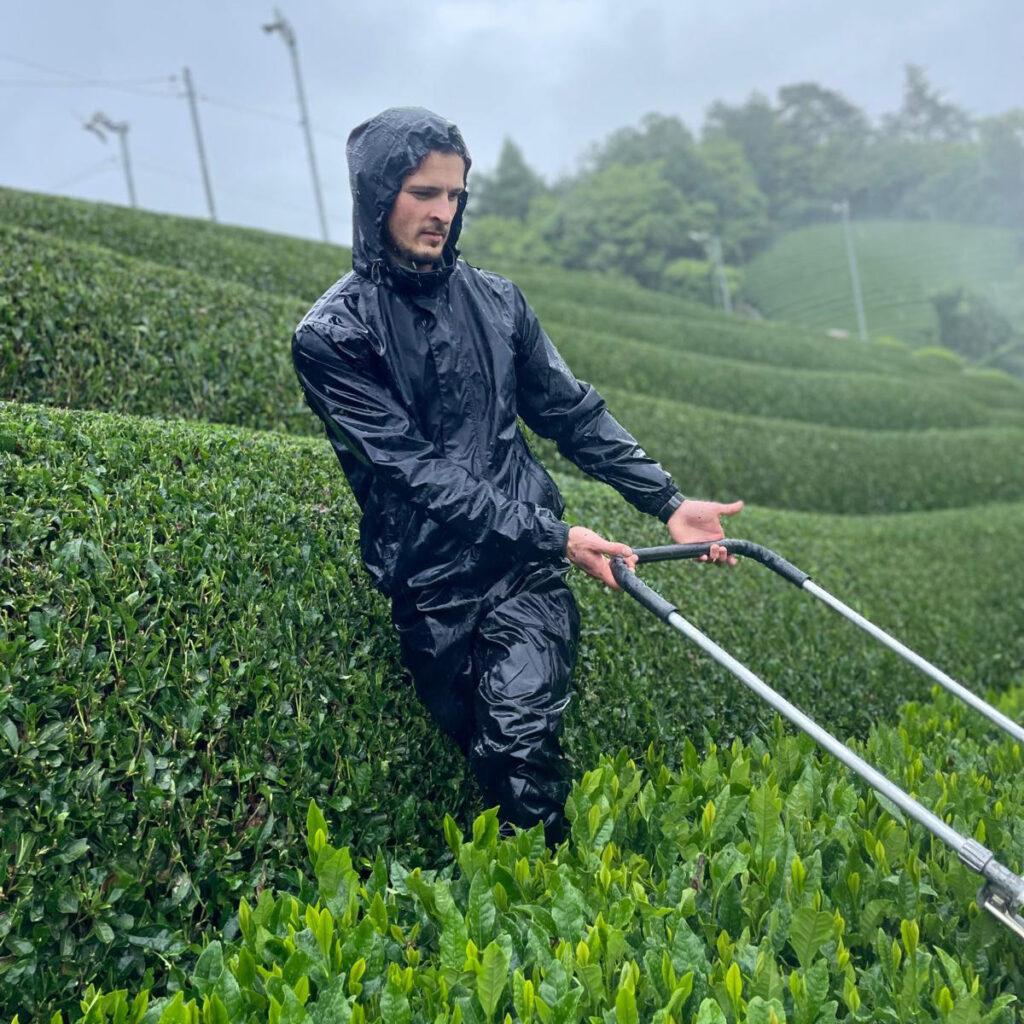Hey tea people!
I am Till, a 26-year-old tea lover from Germany, who at some point decided to quit his ever-iterating job as a physical therapist to embark on a one year long explorative journey to a country I always wanted to visit to delve into Japanese green tea and other fascinating parts of Japanese culture, such as Katana-Making, Japanese style carpentry and of course Japanese language, since language is the key to a real understanding of a culture.
A few years before I came to Obubu I stumbled upon a video on Youtube, that popped up in the recommendations. As it turns out the good old Youtube-algorithm at that time knew better than me what I was searching for. The video had been produced by a previous intern of Obubu, who payed Obubu a visit a few years earlier and while looking over one of Obubu’s tea fields – unfortunately only through a computer screen – I thought to myself: “At some point in my life, I want to make a batch of tea with my own hands”.

Two years passed, in which I discovered Japanese green tea on my own, after a friend of mine had brought some Japanese Sencha for my birthday, which we prepared in a chunky western made kyusu. When I took the first sip of my first ever authentic Japanese Sencha I felt like I had found a taste that I had been searching for, for quite a while. Till then I only knew the good old tea-bag-green-tea and I remember thinking: “There must be more than that out there, with a real taste-profile”. That is why that sip of tea struck me so hard and made me buy a kyusu from Tokoname, a pair of cups and a few different Japanese green teas, in a matter of just two weeks. A few months later I had already tried out anything from Houjicha to Gyokuro, except Japanese fermented teas like Goichicha and Awabancha.
After those two years of discovering one of my passions, which just happened to be tea on my own, I decided that it was time to change something and get rid of a job, that I only did out of pure necessity, where with every day I lost my passion for working with people in a therapeutic setting more and more. I decided it was time to finally do something that I really was passionate about. Since by that time I had build my very own tea-corner in my apartment and I was sitting on tatami and brewing tea in a Japanese tetsubin every day, I figured that I had to do it. I had to go to Japan. And so the hustle of preparation began. I essentially decided to leave everything I knew behind to travel to the other side of the globe and learn about green tea, Japanese culture and of course Japanese language. I quit my job, cancelled my rental-contract for my apartment and did all the necessary preparation-work to be able to go to Japan, including Visa-Application, Health-care and many more of those exhaustingly tedious processes that are required to embark on a long-term journey. But all of that was very much worth it. Even if it was just for the freedom I experienced after freeing myself of a job I was no longer passionate about.
So after all the only thing left to do was packing up my belongings, of course including my first-ever kyusu from Tokoname and fly to Japan.
That’s how I found Obubu, or rather… Obubu found me ?!

After arriving at Obubu and shaking off some of the jetlag, my Obubu-experience started out with a tea-event, where we had the chance to make Kamairicha ourselves and as it turned out, the chance to learn the first few handy Japanese words like “熱 (あつい)“ (hot). “Kama” (釜) literally translates to kettle or iron pot, while “Iri” (炒り) means broiling / frying and “Cha” (茶) meaning tea, which makes Kamairicha a pan-fired Japanese green tea.
To kick off the event we started by handpicking the youngest, freshest leaves of spring, using only the most tender upper two leaves and the bud, which we then brought to the factory, where we started the pan-firing-process by preheating the Kama over a propane burner, carefully judging the temperature to avoid producing a roasted aroma. Then the leaves were spread out in the Kama and mixed every five seconds to slowly reduce the moisture content. After a few minutes the leaves were transferred to a bamboo-tray, where we started the rolling-process. This cycle of careful heating and consecutive hand-rolling was repeated for around three hours until the tea reached it’s final moisture content, shape and taste-profile and could finally undergo a taste test, being carefully examined by all the participants.
What better way could there be to kick off your time on a tea farm?

After the first few days of slowly getting used to the new time-zone and getting acquainted with the procedures at Obubu, the new batch of interns, which consisted of three fellow interns and me got introduced to the world of tea-tours and tea-farming, which at first can be quite overwhelming because its so much to remember. But after a few weeks passed by I found myself getting more and more familiar with the concept of tea tour, as well as farming and processing tea.
The first farming-experiences
When finally the first day of farming came, we headed up to our training-field, called “Aoimori” or “the blue forest” to do some shading in preparation for the spring-harvest that was about to start. Retrospectively, the ride up the mountain alone made this a memorable experience, because I got to ride in the back of our small pickup truck, which allowed for an astonishing view.
After our first brief farming-experience at Aoimori, we kicked off the spring-season by taking on daily farming straight away and I remember being very excited about my first full shifts and always returning to Obubu with a feeling of satisfaction, because farming really enables you to see the progress you make throughout the day.
As far as I am concerned the late Akky-support-shifts where simply the best, because I had a chance to harvest in the afternoon, starting at around one PM and after harvesting was done process the tea in our Sencha-Factory in the evening until 10 PM. For me being part of the production process from harvesting to the end of the production process was the most exciting part about the internship. At one point I found some leftover leaves in a collection tray underneath our steaming machines conveyor belt, which I decided to make Oolong out of. Not knowing that much about Oolong-production and lacking the time to research, I just went the intuitive route and started rolling the leaves by hand and resting them in multiple cycles in between steaming batches of spring sencha. After my shift I decided to slightly dry the leaves out in a frying pan just a bit, to prevent them from molding and fermenting overnight, so that only enzymatic oxidation could take place and the microbial fermentation would be reduced as much as possible. After letting the batch rest for around 18 hours I finally dried it in my trusty frying pan to get the leaves to 5% moisture content, in order for me to achieve shelf-stability.
When I finally tasted the fruit of my hard labor, I was struck by how well that tea actually turned out, even though it was much more on the black tea side, meaning more oxidized than I had originally planned. Afterall I remember really enjoying especially the first few cups of my first ever self-made and handmade tea. Definitely an internship-highlight.

While in the first few weeks of my stay at Obubu I was still fighting my jetlag and the repercussions of the exhausting preparation-work that I had to take care of before my departure to Japan, after a period of getting acquainted to the ways and means of Obubu’s very unique work-culture, all the new faces around me and very importantly the high workload at Obubu, the relationship to our Senpai and to Obubu’s staff started to develop and we started spending our days off with our Senpai. We visited pottery and tea-fairs, went out to dinner and had a great time together.
For all I know Obubu, unlike other Japanese companies, offers a low-hierarchical structure that enables the interns to take on many responsibilities and tasks that make up integral parts of Obubu’s business-structure and operations, such as managing the social-media-promotion for Internships, cleaning the factory-machines, which are essential for tea-production, or even taking care of sales-data-analytics, depending on their respective backgrounds. This philosophy contributes to the more family-like feeling of Obubu’s work-climate, because the assignment of tasks is based on the individual skillset of the interns and enables them to really contribute to Obubu as part of a team, where nobody is considered to be “just an intern”.
After my internship here at Obubu is over, I will be able to travel through Japan for at least three months and explore the many facettes of Japanese culture that remain to be explored. Other than a rough outline of which places I want to visit, I have no further plans on my further stay in Japan. So I will have to go with the flow of things, or as I like to say “just see what life will throw at me”. In retrospect, for me, the absence of plans almost always led to the most memorable experiences in life, for example when I travelled through Argentina for two months. So why should this time be any different?
After this exciting, however very stressful, appointment- and experience-packed time at Obubu, for the next time I will go with the saying “Be the gardener in battle, who passionately and caringly nurtures his bonsai” and use the following weeks for recuperation and exploration of Japans beautiful nature, culture and architecture.
